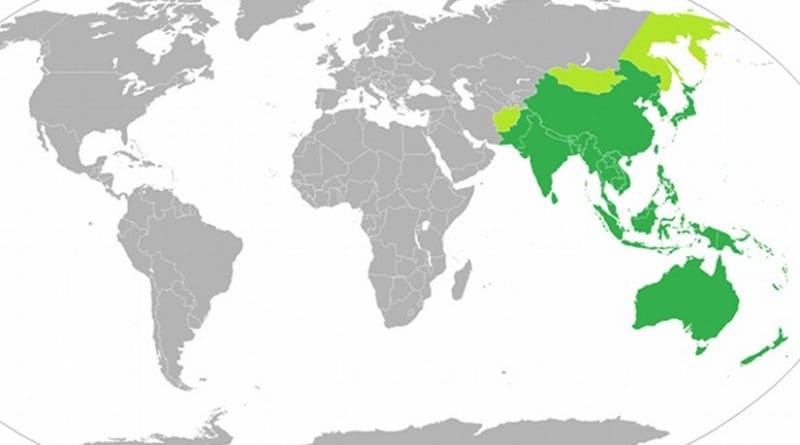Speed Of Change In Fourth Industrial Revolution Calls For Asia Leadership And Clear Mission
The profound changes expected in a new era of advanced technologies and the unprecedented speed of change will require leaders of Industry 4.0 to be agile and adaptive while still keeping in view the mission that drives their corporate existence, agreed panellists in a session on leadership at the Annual General Meeting of the New Champions, which closed Wednesday.
Michelle Zatlyn, Co-Founder and Chief Operating Officer of Cloudflare, said her definition of leadership – the act of motivating a group of people towards a common goal – has not changed. However, she underlined the “certain risk of disruption” if leaders and their organizations do not respond with great agility.
Huang Yiping, Deputy Dean of the National School of Development at Peking University, agreed, noting that those who are innovative and flexible will have a higher chance of surviving the dynamism of the Fourth Industrial Revolution. He expressed concern about unbridled growth, underlining the need to temper the rapid rate of innovation, particularly in the fintech sector, with risk management before another major failure undermines consumer and investor confidence.
Suphachai Chearvanont, Chief Executive Officer at CP Group, emphasized the need to retain a sense of mission and values, especially at a time when chaotic changes are putting ever increasing pressures on leaders.
The command-and-control structure that informs decision-making will have to give way to a more bottom-up approach that empowers employees to participate in a more free-wheeling environment. Zatlyn, however, is unsure that the much-hyped “leading without leaders” style of start-ups is necessarily more effective in fostering agility. “You want agility but you don’t want a whiplash,” she said.
Organizations of the future will be learning organizations, said John Meacock, Global Chief Strategy Officer at Deloitte, who stressed the importance of proper planning and strategy notwithstanding the constant changes and challenges ahead.
Outcomes from the meeting include:
- The Government of the United Arab Emirates joined the Forum’s Closing the Skills Gap initiative, launching an accelerator programme that will be stewarded by the country’s Minister of State for Higher Education and Advanced Skills.
- Leaders in the health and information technologies sectors shaped and committed to developing EPI-BRAIN, a first-of-its-kind data innovation platform to predict and forecast epidemics.
- The Forum announced it will open a branch of the Tropical Forest Alliance in China. The Alliance is an initiative led by the World Economic Forum that aims to remove deforestation from commodity supply chains.
- Bahrain will pilot a set of guidelines for the ethical procurement of artificial intelligence developed by the UK and the Centres for the Fourth Industrial Revolution Network (announced at last year’s Annual Meeting of the New Champions).
- The Inter-American Development Bank (IDB) will use the newly launched Blockchain Single Trade Window framework, developed by IDB and the Forum, to pilot blockchain projects that improve border clearance, and will share lessons and best practices.
- Fahad Almubarak, State Minister, Member of the Saudi Council of Ministers, Saudi G20 Sherpa and Secretary-General of the G20 Saudi Secretariat, chaired a consultation session with Asian stakeholders to gather input for the agenda of its G20 presidency, starting in December.
- Business for Nature, a global coalition to elevate the business call for comprehensive action to reverse nature loss and restore the planet’s vital natural systems, was launched on 2 July.
- A first advisory meeting took place to provide strategic direction to the 28 financial institutions that have signed up to a set of Green Investment Principles. The principles, drafted by a coalition including the Forum, the Green Finance Committee of China, the Society for Finance and Banking and the Green Finance Initiative of the City of London, aim to serve as a voluntary standard for investment into the Belt and Road Initiative.
- As part of a wide-ranging memorandum of understanding between China’s Ministry of Ecology and the Environment (MEE), the two partners announced:
- A collaboration in support of the 2020 Biodiversity Conference of Parties in Kunming, China; the agreement will see the formation of a new community and the publication of a report, The New Nature Economy.
- The Forum also joined the Green Belt and Road Coalition, which will see collaboration with MEE on a number of thematic partnerships, including Environmental Information Sharing and Big Data; Biodiversity and Ecosystem Management; Green Finance and Investment; and Green Technology Innovation.
- South Korea joined the Forum’s Centres for the Fourth Industrial Revolution Network.
- The Forum’s Global Future Council on Agile Governance piloted a new tool, endorsed by the Government of the United Arab Emirates, to help policy-makers and regulators avoid being left behind by rapid technological change.
- The Infrastructure and Urban Development community formed a task force on Risk Allocation and Mitigation to make infrastructure collaborations between the public and private sectors more equitable, future-proof, socially endorsed and immune to political cycles.

